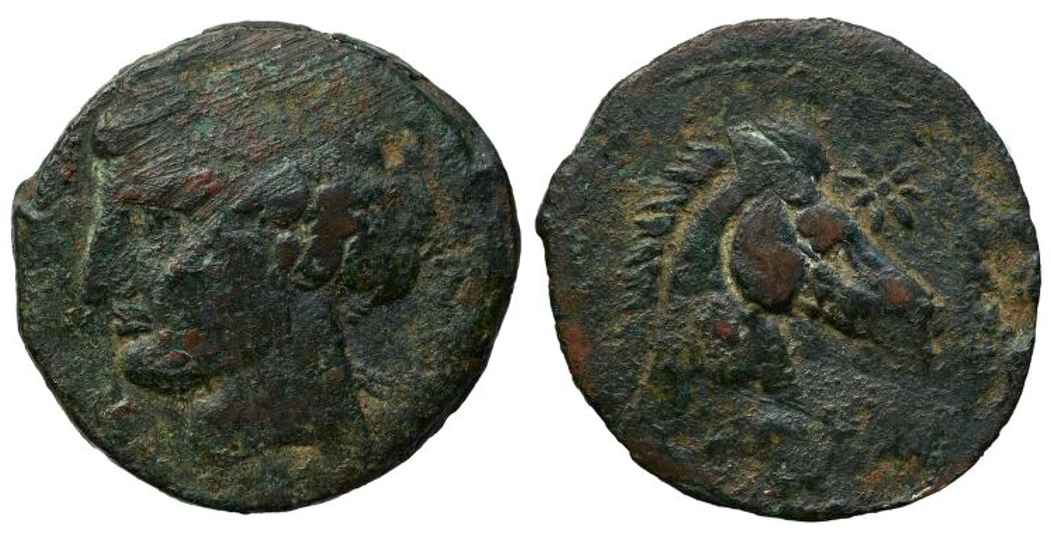SO 219 - Carthage over Sardo-Punic Mint at an uncertain location
From SILVER
242 BCE - 240 BCE
Location/history
| Sale(s)Sale(s) ᵖ: | Classical Numismatic Group EA 378, 13 July 2016, n° 66. | |
| Private collection(s)Private collection(s) ᵖ: | J.-P. Righetti collection, n°23. |
Overstriking coin
Description
| ObverseInscription or printing placed on the obverse.: | Head of Tanit left, wearing necklace, earrings and wreath. Border of dots. | ReverseInscription or printing placed on the reverse.: | Horse standing right, head reverted. Above, Punic kaf and numeral '2'. |
Mint and issuing power
| MintIdentifies the place of manufacture or issue of a numismatic object.: | Carthage | Ancient regionAncient region. | Zeugitana | Modern countryModern country: Tunisia | AuthorityIdentifies the issuing power. The authority can be "pretended" when the name or the portrait of X is on the coin but he/she was not the issuing power. It can also be "uncertain" when there is no mention of X on the coin but he/she was the issuing power according to the historical sources: | Carthaginian Empire |
Chronology
| FromIdentifies the initial date in a range assigned in a numismatic context. 242 BCE toIdentifies the final date in a range assigned in a numismatic context.. 240 BCE | Hellenistic 323-30 BC |
Physical description
| MetalThe physical material (usually metal) from which an object is made.: Bronze |
WeightWeight of the numismatic object (in grams). in grams: 14.8414.84 g <br />14,840 mg <br /> | DenominationTerm indicating the value of a numismatic object. Examples: tetradrachm, chalkous, denarius.: 2 shekels |
AxisDescribes the directional relationship between the obverse and reverse of a numismatic object.: 1212 mm <br />1.2 cm <br /> |
| DiameterDescribes diameter of an object (in mm).: 2828 mm <br />2.8 cm <br /> | |||
References
| Coin referenceReference of the Coin: | Kapossy 1993, n° 23. | Coin series referenceReference to coin series study: | SNG Copenhagen North Africa1SNG Copenhagen North Africa, n° 216, Kapossy 19932Kapossy 1993, n° 23, Alexandropoulos 20073Alexandropoulos 2007, n° 45 var. |
| Coin series web referenceCoin series web references: | |||
Overstruck type
Description
| ObverseInscription or printing placed on the obverse.: | Head of Tanit left, wearing necklace, earrings and wreath. Border of dots (visible on obverse). | ReverseInscription or printing placed on the reverse.: | Horse head right (visible on reverse: hair and shape). |
Mint and issuing power
| MintIdentifies the place of manufacture or issue of a numismatic object. ᵖ: | Sardinia (uncertain Punic mint) | Ancient regionAncient region. ᵖ | Sardinia | Modern countryModern country: Italy | AuthorityIdentifies the authority in whose name (explicitly or implicitly) a numismatic object was issued. ᵖ: | Carthaginian Empire |
Chronology
| FromIdentifies the initial date in a range assigned in a numismatic context. 264 BCE toIdentifies the final date in a range assigned in a numismatic context.. 242 BCE | Hellenistic 323-30 BC |
Physical description
| DenominationTerm indicating the value of a numismatic object. Examples: tetradrachm, chalkous, denarius. ᵖ: | 2 shekels |
References
| Coin type referenceReference to coin series study ᵖ: | SNG Copenhagen North Africa1SNG Copenhagen North Africa, n° 216, Alexandropoulos 20073Alexandropoulos 2007, n° 60 | ||
| Coin series web reference overstruckCoin series web references overstruck: | |||
Additional data
| Frequency of overstrikesFrequency of overstrikes: | Level of confidenceLevel of confidence of the identification: | ||
| RemarksRemarks: | |||
References
- a b Jenkins, Gilbert Kenneth (1992), Sylloge Nummorum Graecorum: Royal Collection of Coins and Medals. Danish National Museum, volume 8. Egypt, North Africa, Spain, Gaul. Sunrise Publ., Inc.
- ^ Kapossy, Balázs (1993), Münzen der Antike : Katalog der Sammlung Jean-Pierre Righetti im Bernischen Historischen Museum, Bern, 425 p., 208 pl.
- a b Alexandropoulos, Jacques (2007), Les monnaies de l'Afrique antique (400 av. J.-C.-40 ap. J.-C.), Presses universitaires du Mirail, Toulouse, 507 p., 17 pl.

